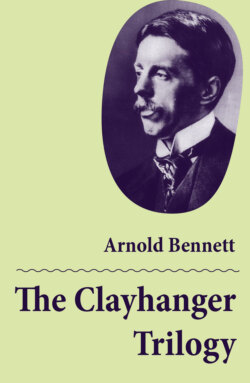Читать книгу The Clayhanger Trilogy (Consisting of Clayhanger + Hilda Lessways + These Twain) - Arnold Bennett - Страница 147
На сайте Литреса книга снята с продажи.
Chapter 14. Money.
ОглавлениеTable of Contents
Things sometimes fall out in a surprising way, and the removal of the Clayhanger household from the corner of Duck Square to the heights of Bleakridge was diversified by a circumstance which Edwin, the person whom alone it concerned, had not in the least anticipated.
It was the Monday morning after the Centenary. Foster’s largest furniture-van, painted all over with fine pictures of the van itself travelling by road, rail, and sea, stood loaded in front of the shop. One van had already departed, and this second one, in its crammed interior, on its crowded roof, on a swinging platform beneath its floor, and on a posterior ledge supported by rusty chains, contained all that was left of the furniture and domestic goods which Darius Clayhanger had collected in half a century of ownership. The moral effect of Foster’s activity was always salutary, in that Foster would prove to any man how small a space the acquisitions of a lifetime could be made to occupy when the object was not to display but to pack them. Foster could put all your pride on to four wheels, and Foster’s driver would crack a whip and be off with the lot of it as though it were no more than a load of coal.
The pavement and the road were littered with straw, and the straw straggled into the shop, and heaped itself at the open side door. One large brass saucepan lay lorn near the doorstep, a proof that Foster was human. For everything except that saucepan a place had been found. That saucepan had witnessed sundry ineffectual efforts to lodge it, and had also suffered frequent forgetfulness. A tin candlestick had taken refuge within it, and was trusting for safety to the might of the obstinate vessel. In the sequel, the candlestick was pitched by Edwin on to the roof of the van, and Darius Clayhanger, coming fussily out of the shop, threw a question at Edwin and then picked up the saucepan and went off to Bleakridge with it, thus making sure that it would not be forgotten, and demonstrating to the town that he, Darius, was at last ‘flitting’ into his grand new house. Even weighted by the saucepan, in which Mrs Nixon had boiled hundredweights of jam, he still managed to keep his arms slanted outwards and motionless, retaining his appearance of a rigid body that swam smoothly along on mechanical legs. Darius, though putting control upon himself, was in a state of high complex emotion, partly due to apprehensiveness about the violent changing of the habits of a quarter of a century, and partly due to nervous pride.
Maggie and Mrs Nixon had gone to the new house half an hour earlier, to devise encampments therein for the night; for the Clayhangers would definitely sleep no more at the corner of Duck Square; the rooms in which they had eaten and slept and lain awake, and learnt what life and what death was, were to be transformed into workshops and stores for an increasing business. The premises were not abandoned empty. The shop had to function as usual on that formidable day, and the printing had to proceed. This had complicated the affair of the removal; but it had helped everybody to pretend, in an adult and sedate manner, that nothing in the least unusual was afoot.
Edwin loitered on the pavement, with his brain all tingling, and excitedly incapable of any consecutive thought whatever. It was his duty to wait. Two of Foster’s men were across in the vaults of the Dragon; the rest were at Bleakridge with the first and smaller van. Only one of Foster’s horses was in the dropped double-shafts, and even he had his nose towards the van, and in a nosebag; two others were to come down soon from Bleakridge to assist.
